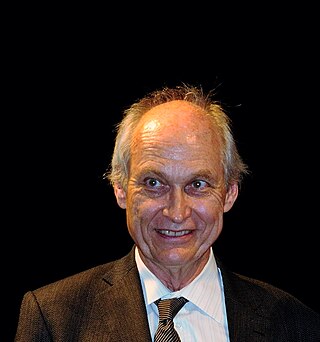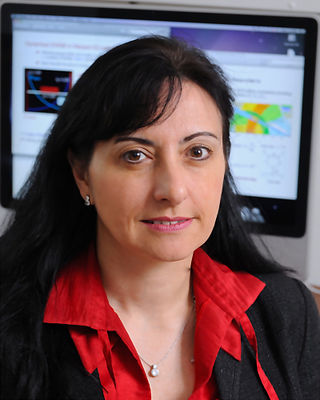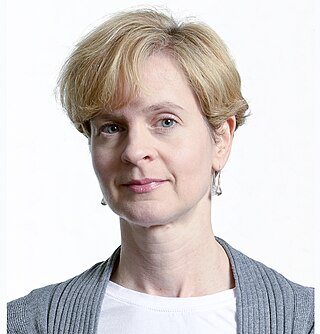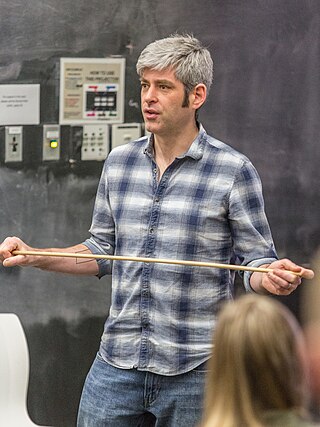
Brian D. Nord is an American astrophysicist and machine learning researcher at Fermi National Accelerator Laboratory (also known as Fermilab or FNAL).

Brian D. Nord is an American astrophysicist and machine learning researcher at Fermi National Accelerator Laboratory (also known as Fermilab or FNAL).
Nord grew up in Wisconsin. [1] Nord studied physics at the Johns Hopkins University, graduating with a B.A. in physics in 2003, and went on to graduate school at the University of Michigan in Ann Arbor, where he got a PhD in physics. Nord's doctoral dissertation is titled Virtual Sky Surveys and Multi-wavelength Investigations of Galaxy Clusters.
After getting his doctorate, Nord won a National Science Foundation (NSF) Alliance for Graduate Education and the Professoriate (AGEP) Fellowship, and remained at the University of Michigan to continue his research. In 2012, Nord became a postdoctoral associate at Fermilab, and joined the faculty of the University of Chicago in 2017.
Nord is part of Fermilab's Machine Intelligence Group, which works to apply Artificial Intelligence to a diverse set of problems in high energy physics, astrophysics, and cosmology. [2]
Nord's research focuses on a number of areas in cosmology: he studies novel methods for detecting gravitational lenses, [3] as well as cosmological survey simulation and design. Nord's work has been written about extensively in such outlets as The Atlantic , [4] Science , [3] symmetry, [2] and others. [5] [6]
In June 2020, in the wake of the murder of George Floyd, Nord organized a global "Strike for Black Lives" along with Chanda Prescod-Weinstein and the Particles for Justice Group. [7] Nord authored a letter on the Particles for Justice page titled "How Long Should We Wait?" On June 10, the day of the strike, over 4,500 academics pledged participation in the strike. Additionally, numerous organizations including Nature , the American Physical Society, the American Association for the Advancement of Science, and the American Institute of Physics supported and/or participated in the strike. [8]

Michael S. Turner is an American theoretical cosmologist who coined the term dark energy in 1998. He is the Rauner Distinguished Service Professor Emeritus of Physics at the University of Chicago, having previously served as the Bruce V. & Diana M. Rauner Distinguished Service Professor, and as the assistant director for Mathematical and Physical Sciences for the US National Science Foundation.

Benjamin Whisoh Lee, or Ben Lee, was a Korean- American theoretical physicist. His work in theoretical particle physics exerted great influence on the development of the standard model in the late 20th century, especially on the renormalization of the electro-weak model and gauge theory.

Marcelo Gleiser is a Brazilian physicist and astronomer.

Bruce Allen is an American physicist and director of the Max Planck Institute for Gravitational Physics in Hannover Germany and leader of the Einstein@Home project for the LIGO Scientific Collaboration. He is also a physics professor at the University of Wisconsin–Milwaukee and the initiator / project leader of smartmontools hard disk utility.

Sean Michael Carroll is an American theoretical physicist and philosopher who specializes in quantum mechanics, cosmology, and philosophy of science. Formerly a research professor at the Walter Burke Institute for Theoretical Physics at the California Institute of Technology (Caltech) department of physics, he is currently an external professor at the Santa Fe Institute, and the Homewood Professor of Natural Philosophy at Johns Hopkins University. He has been a contributor to the physics blog Cosmic Variance, and has published in scientific journals such as Nature as well as other publications, including The New York Times, Sky & Telescope and New Scientist. He is known for his atheism, his vocal critique of theism and defense of naturalism. He is considered a prolific public speaker and science populariser. In 2007, Carroll was named NSF Distinguished Lecturer by the National Science Foundation.

Nigel Stuart Lockyer is a British-American experimental particle physicist. He is the current director of the Cornell Laboratory for Accelerator-based ScienceS and Education (CLASSE) as of May 1, 2023. He was the Director of the Fermi National Accelerator Laboratory (Fermilab), in Batavia, Illinois, the leading particle physics laboratory in the United States, from September 2013 to April 2022.
David Elazzar Kaplan is a theoretical particle physicist at the Johns Hopkins University.

Marcela Silvia Carena Lopez is an Argentine theoretical physicist, and distinguished scientist at the Fermi National Accelerator Laboratory in Batavia, Illinois, where she is also head of the lab's Theory Division. She is also a professor at the University of Chicago, where she is a member of the Enrico Fermi Institute and the Kavli Institute for Cosmological Physics.

Don Lincoln is an American physicist, author, host of the YouTube channel Fermilab, and science communicator. He conducts research in particle physics at Fermi National Accelerator Laboratory, and was an adjunct professor of physics at the University of Notre Dame, although he is no longer affiliated with the university. He received a Ph.D. in experimental particle physics from Rice University in 1994. In 1995, he was a co-discoverer of the top quark. He has co-authored hundreds of research papers, and more recently, was a member of the team that discovered the Higgs boson in 2012.
Marc Kamionkowski is an American theoretical physicist and currently the William R. Kenan, Jr. Professor of Physics and Astronomy at Johns Hopkins University. His research interests include particle physics, dark matter, inflation, the cosmic microwave background and gravitational waves.
Joanne Cohn is an American astrophysicist known for her work in cosmology and particle physics. She is also known for her role in the creation of the ArXiv.org e-print archive. Cohn is a Senior Space Fellow and Full Researcher in the Space Sciences Lab at the University of California, Berkeley.

Patricia Burchat is the Gabilan Professor of Physics at Stanford University who researches experimental particle physics and cosmology. She is interested in mapping dark matter in the universe, and understanding the nature of dark energy. She was named a fellow of the American Physical Society in 2001, and a Guggenheim Fellow in 2005. In 2013 she became a fellow of the American Association for the Advancement of Science.
Richard Battye is a cosmologist, theoretical physicist and former first-class cricketer. He is currently a Professor of Cosmology at the University of Manchester and has been the associate director (science) in the Jodrell Bank Centre for Astrophysics since 2015.

Chanda Prescod-Weinstein is an American theoretical cosmologist and particle physicist at the University of New Hampshire. She is also an advocate of increasing diversity in science.

Wendy Taylor is an Experimental Particle Physicist at York University and a former Canada Research Chair. She is the lead for York University's ATLAS experiment group at CERN.

Daniel Wayne Hooper is an American cosmologist and particle physicist specializing in the areas of dark matter, cosmic rays, and neutrino astrophysics. He is a senior scientist at Fermi National Accelerator Laboratory and a professor of astronomy and astrophysics at the University of Chicago.
David Gerdes (born 1964) is an American astrophysicist, professor, and administrator at the University of Michigan. He is known for his research on trans-Neptunian objects, particularly for his discovery of the dwarf planet, 2014 UZ224.

Brittany Lehua Kamai is an American astrophysicist and racial justice activist. Kamai is a postdoctoral fellow at the University of California, Santa Cruz and the California Institute of Technology. She was the founder of #ShutDownSTEM, part of the Strike for Black Lives held on June 10, 2020. A native Hawaiian, Kamai grew up in Honolulu and graduated from President Theodore Roosevelt High School and the University of Hawaiʻi at Mānoa. She completed her Master of Arts from Fisk University and her PhD from Vanderbilt University. Kamai is only the second native Hawaiian to earn a doctorate in astrophysics and the third to earn a PhD in physics.
Michael Williams is an experimental particle physicist, faculty member at MIT, and inaugural Deputy Director of the NSF AI Institute for Artificial Intelligence and Fundamental Interactions (IAIFI).

Bonnie T. Fleming is an experimental particle physicist who has held leadership roles in several physics experiments and at Fermilab. Since 2022, she has been Fermilab's chief research officer and deputy director for science and technology. She has also served on the faculty of Yale University and the University of Chicago. Fleming is an expert in neutrino physics and liquid argon time projection chamber detector technology.